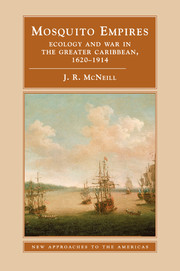Book contents
- Frontmatter
- Contents
- List of Maps
- List of Abbreviations Used in the Footnotes
- Preface
- Acknowledgments
- 1 The Argument (and Its Limits) in Brief
- PART I SETTING THE SCENE
- PART II IMPERIAL MOSQUITOES
- PART III REVOLUTIONARY MOSQUITOES
- 6 Lord Cornwallis vs. Anopheles quadrimaculatus, 1780–1781
- 7 Revolutionary Fevers, 1790–1898: Haiti, New Granada, and Cuba
- 8 Conclusion: Vector and Virus Vanquished, 1880–1914
- Bibliography
- Index
- References
6 - Lord Cornwallis vs. Anopheles quadrimaculatus, 1780–1781
Published online by Cambridge University Press: 05 June 2012
- Frontmatter
- Contents
- List of Maps
- List of Abbreviations Used in the Footnotes
- Preface
- Acknowledgments
- 1 The Argument (and Its Limits) in Brief
- PART I SETTING THE SCENE
- PART II IMPERIAL MOSQUITOES
- PART III REVOLUTIONARY MOSQUITOES
- 6 Lord Cornwallis vs. Anopheles quadrimaculatus, 1780–1781
- 7 Revolutionary Fevers, 1790–1898: Haiti, New Granada, and Cuba
- 8 Conclusion: Vector and Virus Vanquished, 1880–1914
- Bibliography
- Index
- References
Summary
INTRODUCTION
This chapter follows the story of environmental change, mosquitoes, vector-borne disease, differential immunity, and war to two new locales, the Atlantic coastlands of Surinam and the American South. The Surinam excursion is brief. Although illustrative of the power of differential immunity, the rebellion in Surinam carried far smaller consequences than the American Revolution. This chapter also shifts the focus to malaria, part of the earlier stories in the Caribbean, but aside from the English conquest of Jamaica in 1655 never at the center. So in this chapter the political dynamics, the venue, the vector, and the principal disease in question are all different from those in earlier chapters. But as in earlier chapters, mosquitoes in pursuit of human blood shaped human politics.
SLAVE RISINGS AND SURINAM'S MAROONS
From the late seventeenth century onward, Dutch planters had organized a thriving plantation economy along the coastal rivers of Surinam based on African slave labor and sugar, coffee, cocoa, and cotton as export crops. By 1770, some 50,000 to 60,000 slaves toiled on perhaps 400 to 500 plantations. Runaway slaves gradually formed maroon communities in the sprawling swampy forestlands of the interior, and routinely raided the plantations, provoking counter-raids that became an annual ritual by 1749 if not before. Beginning in 1772 the maroons, who now numbered several thousand, embarked on larger attacks against the plantations involving, according to one account, some 2,000 to 3,000 men. They had few and poor weapons, but one powerful ally.
- Type
- Chapter
- Information
- Mosquito EmpiresEcology and War in the Greater Caribbean, 1620–1914, pp. 195 - 234Publisher: Cambridge University PressPrint publication year: 2010

